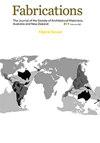Travel à la Mode: Australian Architects and the Changing Nature of the International Tour
IF 0.3
0 ARCHITECTURE
Fabrications-The Journal of the Society of Architectural Historians Australia and New Zealand
Pub Date : 2021-09-02
DOI:10.1080/10331867.2021.2006429
引用次数: 0
Abstract
ABSTRACT For Australian architects of the late nineteenth and early twentieth centuries, the pull to centres of architectural culture was significant. Travel to further one’s architectural education and experience was out of reach for many Antipodean architects because of geographical distance and costs. For others, particular circumstances enabled a period of international travel, having a transformative effect on their subsequent architectural outputs and careers. Not all architectural travel is the same: it has different modes and outcomes, and can be instigated through means as diverse as a reward for years of practice to enlisting in military service. This paper examines the changing role of travel for Australian architects prior to the Second World War. Six distinct modes of travel emerge: the grand tour; the commercial enterprise; the roaming adventure; accidental tourismthat Kilburn took through the United States saw him directly influenced; educational imperative; and finally, as a rite of passage. While the impetus differed, all modes allowed architects to experience places and structures first-hand: to see architecture differently. This increasing role of travel in the careers of architects vastly truncated the distance between the United Kingdom, Europe, North America, and Australia, building educational and professional engagement and networks. These opportunities brought multi-valent benefit to individual architects, as well as new ideas that transformed Australian architecture.旅游模式:澳大利亚建筑师和国际旅游性质的变化
摘要对于十九世纪末二十世纪初的澳大利亚建筑师来说,对建筑文化中心的吸引力是巨大的。由于地理距离和成本的原因,许多安提波德建筑师无法前往进一步的建筑教育和经验。对其他人来说,特殊的环境使他们能够进行一段时间的国际旅行,对他们随后的建筑产出和职业生涯产生了变革性的影响。并非所有的建筑旅行都是一样的:它有不同的模式和结果,可以通过多种方式进行,比如奖励多年的实践和入伍。本文考察了第二次世界大战前澳大利亚建筑师旅行角色的变化。出现了六种不同的旅行方式:盛大的旅行;商业企业;漫游冒险;基尔本在美国的偶然旅行直接影响了他;教育势在必行;最后,作为一种成人仪式。虽然动力不同,但所有模式都让建筑师能够亲身体验地方和结构:以不同的方式看待建筑。旅行在建筑师职业生涯中的作用越来越大,极大地缩短了英国、欧洲、北美和澳大利亚之间的距离,建立了教育和专业参与以及网络。这些机会为建筑师个人带来了多方面的好处,也带来了改变澳大利亚建筑的新想法。
本文章由计算机程序翻译,如有差异,请以英文原文为准。
求助全文
约1分钟内获得全文
求助全文
来源期刊

CiteScore
0.50
自引率
25.00%
发文量
26
 求助内容:
求助内容: 应助结果提醒方式:
应助结果提醒方式:


